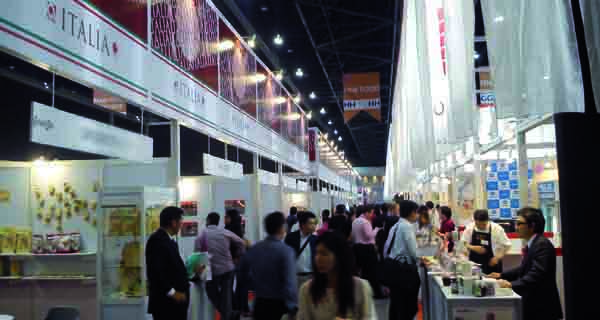
It was important to be there to lay a solid foundation for future trade agreements. With this aim in mind during the recent edition of Thaifex, the annual trade show dedicated to food & beverage that was held may 20 to 24 last year in the Thai capital, some thirty Italian companies met in the Italian pavilion to present their range of products and, at the same time, initiate contact with distributors and local suppliers. Thailand is a tempting market, no one denies it, and channels to enter are varied: from supermarkets to traditional elegant food courts based on gourmet food, going from convenience stores and the large number of Italian restaurants, up to the hotel segment which carefully offers its guests an excellent restaurant service.
Among the more than 1,500 exhibitors there was therefore a large group of Italian companies. Food, who was at the fair, interviewed some of them and ask them to explain the reasons that convinced them to attend an event of this magnitude. For many of them it is due to Thailand being a ‘hub’ linking with neighbouring countries.
Each company has its own business plan. Inalca, Cremonini Group company, wanted to ensure an efficient supply chain in the territory, having acquired, in april, a local distribution company. The main target is restaurants and hotels, but the Modena based company does not hide its intention to debut on the shelves of major retail chains. “In modern distribution we set out to reach the high-end because our offer falls within the range of premium products – says Augusto Cremonini, ceo of Inalca F&B. If currently in Asia we are present only in China, thanks to Thaifex we can weave new business relations with all those countries where the demand for Made in Italy food is high. I mean, besides Thailand, Singapore, Malaysia and the Philippines”.
However, the situation is less simple than it seems. To invest in the Thai market makes sense, but also entails sacrifices. Especially for wine producers, which have hefty duties. It is sufficient to say that, once arrived in customs, each bottle placed on the market is subject to 400% the listed price. A situation that is considered highly detrimental, but that does not deter the various producers, encouraged by the growing demand for Italian wines by Asian consumers. Products that are known in the industry, for example Lambrusco, retain strong appeal, according to two companies (Chiarli and Gruppo Donelli), as does Nobile di Montepulciano, imported by Tenuta del Cerro. In any case, the choice often falls on a light wine.
“In Thailand consumers prefer wines with a low alcohol content, says Thomas Grootveldt, export manager of Chiarli. It is true that here the only gods are the French labels, but Italian wine will become more and more competitive by offering products with good value for money “. Where the price tag has some weight in guiding the consumers’ purchasing decisions, also the innovative aspect plays an important role. “The Thai people are dynamic and show interest for everything that looks new – claims Angela Giacobazzi, export manager of the Gruppo Donelli. For this reason we are presenting tantalizing drinks, such as the range of cocktails and natural flavoured grape juices, which are distributed in the horeca and large-scale distribution channel respectively. We are launching our products in Thailand to consolidate our business and move towards new frontiers that we believe to be Vietnam and Myanmar. “
Wine aside, the other product categories get better treatment, with much lower duties(see table).
This is the case for oil and vinegar, which are a bet in a market where dressings are not, traditionally, part of the local eating habits. But in this case the target audience is the large amount of tourists who annually visit the ‘The Land of Smiles’. Quite a challenge with high expectations, state the optimistic export mangers of two companies, namely Monari Federzoni and Gruppo Farchioni, who believe that in Thailand ‘every dressing is possible’. A similar situation is true for companies that produce bread substitutes. Grissin Bon is optimistic that the breadsticks can find room at the table. “Having to approach people who do not habitually consume products made from flour, observes Guido Spinelli, export manager of the company that has its headquarters in the province of Reggio Emilia. We closely follow the spread of local Italian restaurants, as well as the growing number of foreign residents in Thailand. “
From savoury to sweet products, Dolfin, a confectionery company from Catania, in turn hopes to conquer Thai hearts through their stomachs. The basic range consists of fruit juices and ice cream to be frozen in the freezer, as well as a line of fruit jellies, designed and manufactured specifically for the Thai market, demonstrating that the export strategies of local tastes can be an important indicator for a complete product range.
